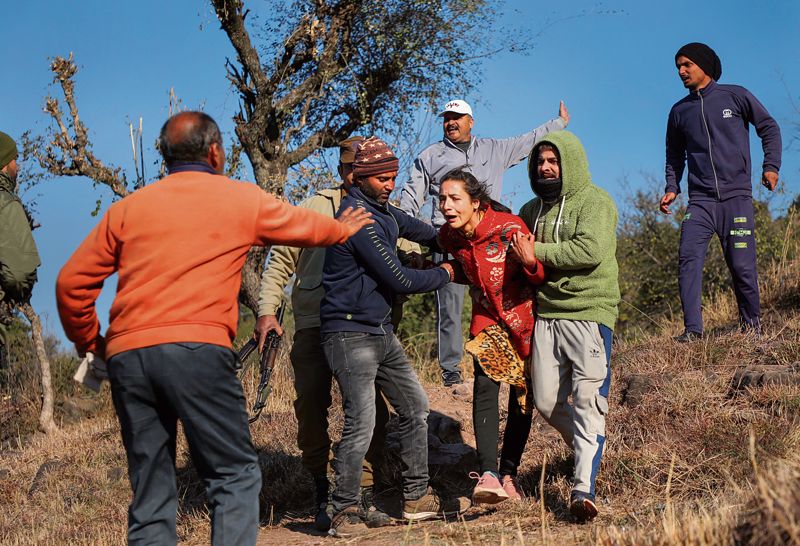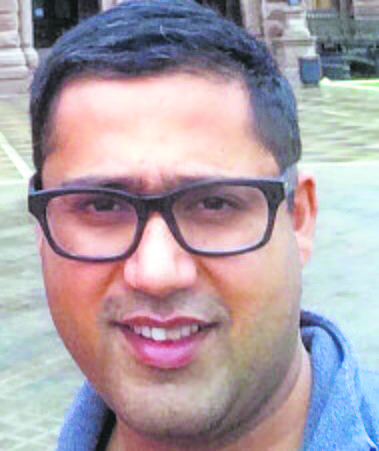
EGREGIOUS: The killing of six persons in Dangri village of Rajouri district revives the blood-stained memories of the brutal attacks to the south of Pir Panjal. PTI
Luv Puri
Journalist and Author
ON February 19, 1998, just hours before then Prime Minister Atal Bihari Vajpayee was to embark on the Lahore bus journey, which was supposed to be a curtain-raiser to the Vajpayee-Sharif peace initiative, terrorists killed 20 villagers in Rajouri and neighbouring Reasi districts of J&K. The design of the terrorists was to shrink the PM’s domestic political space and sabotage the peace initiative.
The recent egregious killings of six villagers in Dangri village of Rajouri district on January 1 seemingly lack any viable or sustainable grand design that could succeed. But the killings revive the blood-stained memories of equally brutal attacks and mass murders to the south of Pir Panjal that divides the Kashmir valley from Jammu. The killings defied simplistic conclusions, but that doesn’t mean past lessons cannot be invoked to buttress the state’s counter-terrorism capacity and save innocent lives.
Jammu & Kashmir’s hilly Rajouri-Poonch area in terms of geography and ethnicity is a mirror image of the areas across the Line of Control. The area largely remained free from militancy-related incidents that impacted the Valley till the mid-1990s. The reason was obvious as militants kept a low profile in the area. The heights and meadows of vast and heavily forested Pir Panjal mountain range that nestles Rajouri-Poonch provided natural hideouts and shortest route to south Kashmir after infiltration from across the Line of Control.
The reality changed as the security forces tried to nip the problem at its root and initiated sanitising operations in the hinterland. In September 1997, militants engaged the Army positions around Thana Mandi, falling in Rajouri, directly by occupying the heights of Ratan Pir and fired mortars. It took the Army a week to clear the area. In contrast to relatively religiously polarised societies in militancy-infested areas of Doda, Bhaderwah and Kishtwar, the killings in the Rajouri-Poonch belt didn’t follow any pattern.
All religious and ethnic communities were harmed by terrorists in the Rajouri-Poonch area. On July 1, 1999, nine Hindu villagers at Mendhar in Poonch district were killed. The terrorists tried to exploit conservative local resentment over an inter-religious marriage. This was preceded by killings in the Budhal area of Rajouri on September 24, 1997, in which eight Hindus were killed. This led to migration from the hills to Rajouri town. Terrorists also beheaded two Hindu priests on the Surankote-Poonch road on August 28, 2001.
The Muslim community suffered equally. The first major terrorism-related incident in Poonch was the killing of 20 members of a family in the Sailan area of Surankote. The incident was a direct response to the intra-terrorist group infighting when a terrorist of a particular ethnicity was killed by terrorists of a different ethnic group on August 3, 1998. The lone survivor of the massacre was Mohammad Shabir Sheikh, a teenager at that time. He had told the author that he escaped the massacre as he had gone out of the house to relieve himself. He hid himself in the nearby bushes as he saw his family members being killed. Sheikh told me that just two years after the massacre of his family, a group of terrorists approached him to join them so that he could take revenge. Insecurity and vengeance often drove recruitment in militant ranks in the late 1990s.
One of the unsung heroes of the local resistance in the Rajouri-Poonch belt that gave a death blow to terrorism in the area was late Haji Mohammad Qasim. He and his men fought against Lashkar terrorists in the Marrah area of Surankote in the last quarter of 2003. The area, situated in the hinterland and hard to access, was virtually controlled by terrorists. Giving up their lucrative marble business in Saudi Arabia as economic migrants, Haji and his men mobilised locals to fight the Lashkar terrorists. With arm training from the security forces, they succeeded in evicting terrorists from the area. There were acts of revenge as he lost clan members, but they held ground. In one of the many field trips to his village, Haji, who died a few years ago, told me that the entire community was aghast against the diktats of terrorists and it just needed a spark to enable the resistance.
The last three decades of violence in the area imparts specific lessons. First, the recent incidents in the Rajouri-Poonch area, including a suicide attack on August 11, 2022, in which five soldiers were killed, reflect the need for a more astute knowledge of the local milieu. In the Kashmir valley, it is easy to spot Punjabi-speaking infiltrators from the local Kashmiri-speaking population and the experience of 1947, 1965 or even the last three decades bears that. In the case of the areas to the south of Pir Panjal, it is difficult to distinguish a Punjabi speaker from the locals because of the linguistic affinity.
Second, an objective review of the current fencing capabilities along the 740-km Line of Control and 190-km international border is required. Just a few days before the Rajouri killings, on December 28, 2021, a truck on the Jammu-Srinagar highway was intercepted as a result of random checking and four terrorists, who were hiding in the truck, were killed. The driver managed to escape. He had apparently picked up the terrorists after they had infiltrated from the plain India-Pakistan border.
Another instance that came to light in the police investigation was a foiled bid to target Prime Minister Narendra Modi’s rally in J&K on April 24, 2022. According to the police, a truck driver had transported two terrorists after infiltration from the Samba sector and another person had sheltered them. These incidents reflect that some terrorists are managing to sneak in from the international border.
In this connection, there is a demand to deploy machines along checkposts that could scan the trucks plying on the Jammu-Srinagar National Highway without physical inspection. The modus operandi of the infiltrated terrorists is to hide in truck cavities. A random search of the trucks makes detection a low probability exercise and enhances risk to the lives of the security personnel.
Third, apart from strengthening the counter-terrorism grid, a political class and civil society transcending the religious and ethnic ties is a prime catalyst in mounting a collective societal deterrence against terrorists in Rajouri-Poonch, an area which is vast and hilly. In the face of recent developments, a detailed review of counter-terrorism is required which factors in the new realities and also draws from the three decades of counter-terrorism experience of J&K.
Join Whatsapp Channel of The Tribune for latest updates.




























